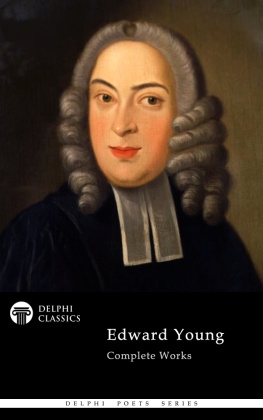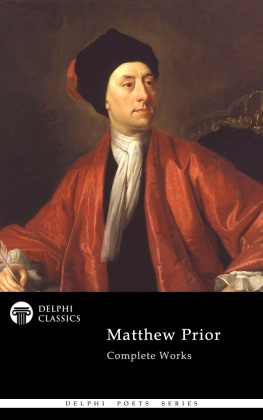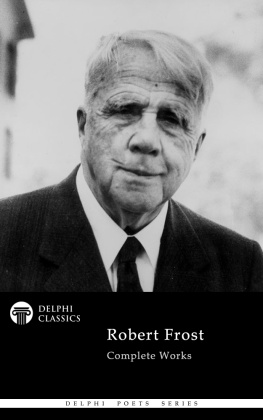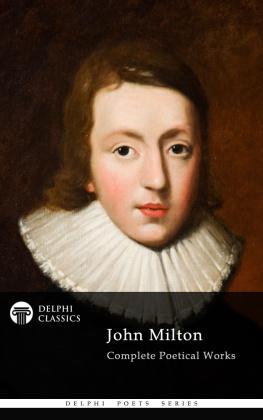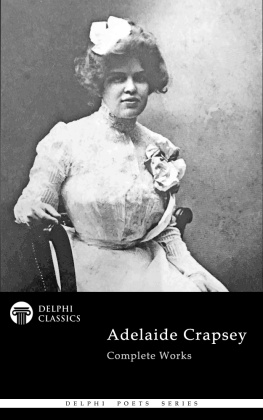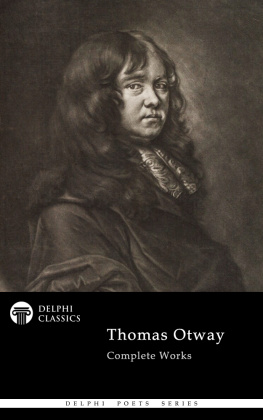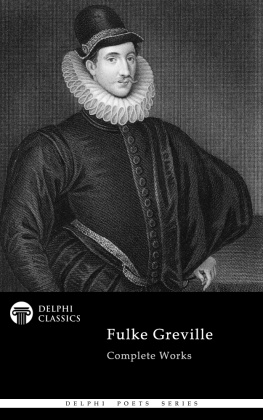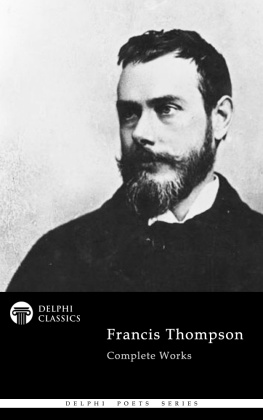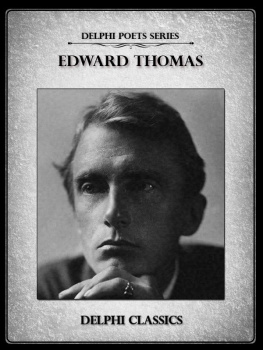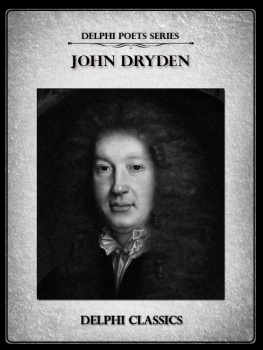Edward Young - Edward Young - Delphi Poets Series
Here you can read online Edward Young - Edward Young - Delphi Poets Series full text of the book (entire story) in english for free. Download pdf and epub, get meaning, cover and reviews about this ebook. year: 2020, publisher: Delphi Classics, genre: Science. Description of the work, (preface) as well as reviews are available. Best literature library LitArk.com created for fans of good reading and offers a wide selection of genres:
Romance novel
Science fiction
Adventure
Detective
Science
History
Home and family
Prose
Art
Politics
Computer
Non-fiction
Religion
Business
Children
Humor
Choose a favorite category and find really read worthwhile books. Enjoy immersion in the world of imagination, feel the emotions of the characters or learn something new for yourself, make an fascinating discovery.
- Book:Edward Young - Delphi Poets Series
- Author:
- Publisher:Delphi Classics
- Genre:
- Year:2020
- Rating:3 / 5
- Favourites:Add to favourites
- Your mark:
- 60
- 1
- 2
- 3
- 4
- 5
Edward Young - Delphi Poets Series: summary, description and annotation
We offer to read an annotation, description, summary or preface (depends on what the author of the book "Edward Young - Delphi Poets Series" wrote himself). If you haven't found the necessary information about the book — write in the comments, we will try to find it.
Edward Young - Delphi Poets Series — read online for free the complete book (whole text) full work
Below is the text of the book, divided by pages. System saving the place of the last page read, allows you to conveniently read the book "Edward Young - Delphi Poets Series" online for free, without having to search again every time where you left off. Put a bookmark, and you can go to the page where you finished reading at any time.
Font size:
Interval:
Bookmark:


Edward Young
(1683-1765)

Contents

Delphi Classics 2020
Version 1









Browse the entire series


Edward Young

By Delphi Classics, 2020
Edward Young - Delphi Poets Series
First published in the United Kingdom in 2020 by Delphi Classics.
Delphi Classics, 2020.
All rights reserved. No part of this publication may be reproduced, stored in a retrieval system, or transmitted, in any form or by any means, without the prior permission in writing of the publisher, nor be otherwise circulated in any form other than that in which it is published.
ISBN: 978 1 91348 723 2
Delphi Classics
is an imprint of
Delphi Publishing Ltd
Hastings, East Sussex
United Kingdom
Contact: sales@delphiclassics.com

www.delphiclassics.com
NOTE

When reading poetry on an eReader, it is advisable to use a small font size and landscape mode, which will allow the lines of poetry to display correctly.

Enlighten your digital library
explore the 18 th Century at Delphi Classics


Upham, a small village near Winchester, Hampshire Young was the son of Edward Young, later Dean of Salisbury, and was born at his fathers rectory at Upham.

View of the countryside surrounding the village

From 1911 Encyclopdia Britannica, Volume 28
EDWARD YOUNG (16831765), English poet, author of Night Thoughts , son of Edward Young, afterwards dean of Salisbury, was born at his fathers rectory at Upham, near Winchester, and was baptized on the 3rd of July 1683. He was educated on the foundation at Winchester College, and matriculated in 1702 at New College, Oxford. He soon removed to Corpus Christi, and in 1708 was nominated by Archbishop Tenison to a law fellowship at All Souls, for the sake of Dean Young, who died in 1705. He took his degree of D.C.L . in 1719. His first publication was an Epistle to.... Lord Lansdoune (1713). It was followed by a Poem on the Last Day (1713), dedicated to Queen Anne; The Force of Religion, or Vanquishd Love (1714), a poem on the execution of Lady Jane Grey and her husband, dedicated to the countess of Salisbury; and an epistle to Addison, On the late Queens Death and His Majestys Accession to the Throne (1714) in which he made indecent haste to praise the new king. The fulsome style of these dedications ill accords with the pious tone of the poems, and they are omitted in the edition of his works drawn up by himself. About this time began his connexion with Philip, duke of Wharton, whom he accompanied to Dublin in 1717. In 1719 his play of Busiris was produced at Drury Lane, and in 1721 his Revenge. The latter play was dedicated to Wharton, to whom it owed, said Young, its most beautiful incident. Wharton promised him two annuities of 100 each and a sum of 600 in consideration of his expenses as a candidate for parliamentary election at Cirencester. In view of these promises Young said that he had refused two livings in the gift of All Souls College, Oxford, and had also sacrificed a life annuity offered by the marquess of Exeter if he would act as tutor to his son. Wharton failed to discharge his obligations, and Young, who pleaded his case before Lord Chancellor Hardwicke in 1740, gained the annuity but not the 600. Between 1725 and 1728 Young published a series of seven satires on The Universal Passion. They were dedicated to the duke of Dorset, Bubb Dodington (afterwards Lord Melcombe), Sir Spencer Compton, Lady Elizabeth Germain and Sir Robert Walpole, and were collected in 1728 as Love of Fame , the Universal Passion. This is qualified by Samuel Johnson as a very great performance, and abounds in striking and pithy couplets. Herbert Croft asserted that Young made 3000 by his satires, which compensated losses he had suffered in the South Sea Bubble. In 1726 he received, through Walpole, a pension of 200 a year. To the end of his life he continued to urge on the government his claims to preferment, but the king and his advisers persisted in regarding this sum as an adequate settlement.
Young was nearly fifty when he decided to take holy orders. It was reported that the author of Night Thoughts was not, in his earlier days, the ornament to religion and morality which he afterwards became, and his intimacy with the duke of Wharton and with Lord Melcombe did not improve his reputation. A statement attributed to Pope probably gives the correct view. He had much of a sublime genius, though without common sense; so that his genius, having no guide, was perpetually liable to degenerate into bombast. This made him pass a foolish youth, the sport of peers and poets; but his having a very good heart enabled him to support the clerical character when he assumed it, first with decency and afterwards with honour (O. Ruffhead, Life of A. Pope , ). In 1728 he was made one of the royal chaplains, and in 1730 was presented to the college living of Welwyn, Hertfordshire. He married in 1731 Lady Elizabeth Lee, daughter of the 1st earl of Lichfield. Her daughter, by a former marriage with her cousin Francis Lee, married Henry Temple, son of the 1st viscount Palmerston. Mrs Temple died at Lyons in 1736 on her way to Nice. Her husband and Lady Elizabeth Young died in 1740. These successive deaths are supposed to be the events referred to in the Night Thoughts as taking place ere thrice yon moon had filled her horn (Night i.). In the preface to the poem Young states that the occasion of the poem was real, and Philander and Narcissa have been rather rashly identified with Mr and Mrs Temple. M. Thomas suggests that Philander represents Thomas Tickell, who was an old friend of Youngs, and died three months after Lady Elizabeth Young. It was further supposed that the infidel Lorenzo was a sketch of Youngs own son, a statement disproved by the fact that he was a child of eight years old at the time of publication. The Complaint , or Night Thoughts on Life , Death and Immortality , was published in 1742, and was followed by other Nights, the eighth and ninth appearing in 1745. In 1753 his tragedy of The Brothers , written many years before, but suppressed because he was about to enter the Church, was produced at Drury Lane. Night Thoughts had made him famous, but he lived in almost uninterrupted retirement, although he continued vainly to solicit preferment. He was, however, made clerk of the closet to the princess dowager in 1761. He was never cheerful, it was said, after his wifes death. He disagreed with his son, who had remonstrated, apparently, on the excessive influence exerted by his housekeeper Miss (known as Mrs) Hallows. The old man refused to see his son before he died, but is said to have forgiven him, and left him his money. A description of him is to be found in the letters of his curate, John Jones, to Dr Samuel Birch. He died at Welwyn on the 5th of April 1765.
Next pageFont size:
Interval:
Bookmark:
Similar books «Edward Young - Delphi Poets Series»
Look at similar books to Edward Young - Delphi Poets Series. We have selected literature similar in name and meaning in the hope of providing readers with more options to find new, interesting, not yet read works.
Discussion, reviews of the book Edward Young - Delphi Poets Series and just readers' own opinions. Leave your comments, write what you think about the work, its meaning or the main characters. Specify what exactly you liked and what you didn't like, and why you think so.

